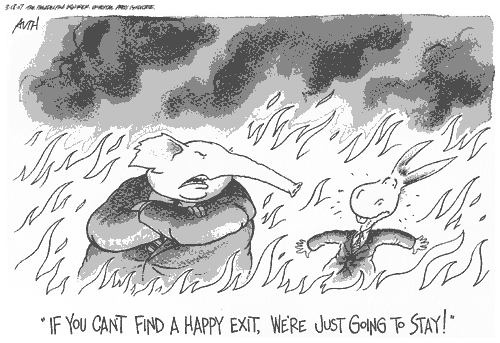Saturday, March 31, 2007
NYT: More Than 100 Are Killed in Iraq as a Wave of Sectarian Attacks Shows No Sign of Letting Up
http://alternet.org/blogs/video/49743/
----------
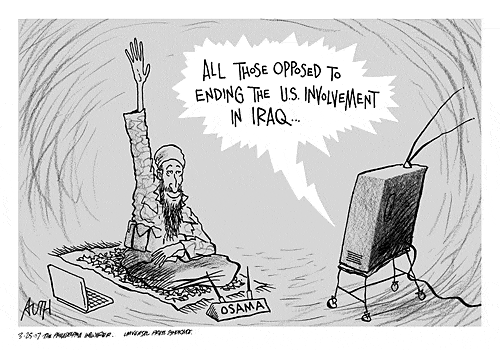
 | |
Ibrahim Sultan/Reuters A street scene in Mahmudiya, south of Baghdad, where a car-bomb attack in a parking lot near a hospital killed four people and wounded 20. |
More Than 100 Are Killed in Iraq as a Wave of Sectarian Attacks Shows No Sign of Letting Up
BAGHDAD, March 29 — More than 100 people were killed Thursday in a series of attacks around Iraq that included two suicide bombings that struck crowded markets during the week’s busiest shopping hours, the authorities said.
The attacks extended an extraordinary surge of sectarian violence in Iraq this week, including a series of bombings and reprisals in the northern city of Tal Afar in which more than 140 people were killed in two days.
On Thursday, officials said 18 police officers in Tal Afar suspected of participating in the massacre of Sunni Arab residents in reprisal for the bombing of a Shiite neighborhood had been freed after being detained for only a few hours.
At a time when the Shiite-dominated central government has been under intense pressure to rein in Shiite militias and death squads, the releases are sure to bring even more outrage from Sunni Arabs.
The deadliest attacks on Thursday were aimed at predominantly Shiite neighborhoods in central Iraq and appeared to be part of a fierce campaign by Sunni Arab insurgents to undermine the latest government security plan for Baghdad.
At least 60 people, mostly women and children, were killed when a man wrapped in an explosive belt walked into a crowded street market in the Shaab neighborhood of eastern Baghdad and detonated the belt, an Interior Ministry official said. At least 25 people were wounded.
The attack appeared to be carefully timed, hitting just after sundown on the eve of the Muslim day of prayer, when markets are packed.
Two hours earlier, a coordinated attack involving three suicide car bombers, including one driving an ambulance, killed at least 28 people, including women and children, and wounded 53 in the predominantly Shiite town of Khalis, about six miles north of Baquba in the violently contested province of Diyala, according to the Iraqi authorities.
The first of those suicide car bombs was detonated at a crowded market, according to a senior Iraqi security official in Baquba. As people rushed to help victims of the first car bombing, a second such bomb went off, killing and wounding rescuers and security forces, the official said.
The third suicide bomber, who was driving a stolen ambulance, apparently had engine problems about 500 yards from the central hospital, his apparent target, the security official said. When several people approached the man to help, the official said, he detonated his explosives.
The attacks came on the heels of a two-day spate of sectarian bloodshed in Tal Afar, during which a double suicide bombing in a Shiite neighborhood was answered by a Shiite massacre of Sunni residents. More than 140 people have been killed there, with at least 210 people wounded, officials said.
Prime Minister Nuri Kamal al-Maliki immediately ordered an investigation into the killings. Interior Minister Jawad al-Bolani told the government-run television channel Iraqiya on Wednesday that the government would “take legal action” against the 18 police officers who had been arrested and accused of involvement in the massacre, in which at least 70 people were killed.
But on Thursday, officials in Nineveh Province, where the attacks occurred, said the police officers had been held only briefly by the Iraqi Army and released.
Nineveh’s governor, Durad Kashmul, said at a news conference that the the army had freed the policemen “to deter strife” after a street demonstration demanding their release, Reuters reported.
Husham al-Hamdani, the head of the provincial security committee, confirmed to The Associated Press that the officers had been freed but gave no reason. Repeated calls to the spokesmen for the Iraqi military command went unanswered, and an envoy from Prime Minister Maliki who visited Tal Afar said he could not confirm or deny the report that the policemen had been released.
In Baghdad, a bomb placed on a popular shopping street in the Baya district killed 10 people and wounded 20, according to officials at the Interior Ministry and Yarmuk Hospital. A car bomb exploded near a hospital in Mahmudiya, south of Baghdad, killing four people and wounding 20, the ministry official said. And a suicide car bomber detonated himself at an Iraqi Army checkpoint in the Jamiya district of western Baghdad, killing three soldiers and wounding 16.
At least eight more people were killed by gunmen in Baghdad and Mosul, officials said, including a guard employed by the Shiite politician Ahmad Chalabi. At least 25 bodies were discovered around Baghdad.
In the capital, Ryan C. Crocker was sworn in as the new American ambassador to Iraq. At the ceremony, in the international Green Zone, Mr. Crocker said: “Turning the tide from oppression to freedom does not come overnight. It does not come without high costs.”
He added: “President Bush’s policy is the right one. There has been progress; there is also much more to be done.”
Thursday, March 29, 2007
NYT: 47 Are Killed in Iraq Bombings, 20 in Baghdad
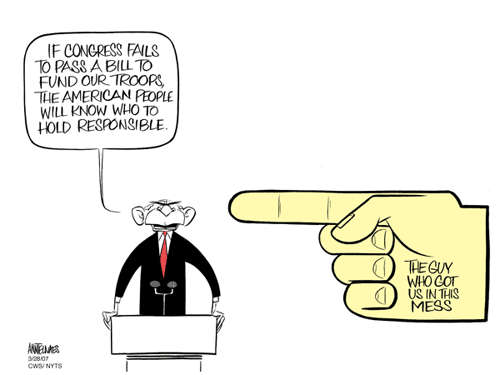
 | ||
David Furst/Agence France-Presse — Getty Images An Iraqi police officer walked amid the wreckage caused Saturday by a suicide bombing in Baghdad that killed 20 people. The attack at a heavily fortified police compound wounded at least 26 people. | ||
47 Are Killed in Iraq Bombings, 20 in Baghdad
BAGHDAD, March 24 — A suicide bomber driving a truck carrying explosives hidden under construction materials on Saturday was waved through a checkpoint at a heavily fortified police compound in southern Baghdad, where he detonated his payload, killing at least 20 people, an Interior Ministry official said.
The attack was the deadliest of a wave of suicide bombings around Iraq on Saturday that killed at least 47 people, many of them policemen, the authorities said.
Despite the infusion of American and Iraqi troops to Baghdad this year, suicide bombings, a hallmark of the Sunni Arab-led insurgency, have been rising. Maj. Gen. William B. Caldwell IV, the top spokesman for the United States military here, said last week that the number of car bombs in Baghdad reached a record high of 44 in February, of 77 nationwide.
With Shiite militias largely lying low since the start of the security crackdown, American generals say their primary focus is to curtail the Sunni insurgency’s high-profile attacks by raiding car bomb factories and erecting blast walls in areas where large groups of people congregate, like public markets.
The suicide bombing against the police station, in the Dora neighborhood of southern Baghdad, was particularly brazen. The two-story building serves as the district headquarters for a large swath of southern Baghdad. It is set within a perimeter of tall walls, sandbag fortifications, police checkpoints and a chicane of traffic barriers designed to impede a fast approach by a vehicle bomber.
But according to a police official at the Interior Ministry, police officers apparently thought the driver on Saturday was hauling bricks to a site next door, where a new police headquarters is under construction. The driver was waved through and then set off his explosives in a devastating blast that was audible on the other side of the sprawling capital. Those killed were mostly policemen, but several were prisoners being held in the station, the official said. At least 26 people were wounded.
Dora has been one of the most violent areas in the city. A concentrated effort by American and Iraqi troops to seal off and clear the neighborhood last summer did not last, and violence rose sharply. But in recent weeks, American commanders have said that the latest security plan has tamed parts of the district.
Under the plan, thousands of fresh American troops are also being sent to the western province of Anbar, a wellspring and refuge of the Sunni Arab insurgency.
The American military said Saturday that two soldiers were killed in combat on Friday, one in Anbar and the other in Baghdad.
In Suhada, a village in western Anbar near the Syrian border, three suicide car bombers attacked police posts in a seemingly coordinated triple attack. One detonated himself outside a police station, and the other two struck police checkpoints, according to Col. Ahmad Jeedan, an Iraqi Army commander in Qaim. At least eight people were killed and 20 wounded, he said.
Another suicide bomber driving a truck with boxes of new shoes destroyed a Shiite mosque in Haswa, about 40 miles south of Baghdad, killing 11 people and wounding 45, according to an Iraqi Army officer and a police official in Haswa.
At least eight people were killed and another eight wounded in the northwestern town of Tal Afar when a suicide bomber wearing an explosives belt blew himself up inside a food store, the chief of the city’s main hospital said.
In Baghdad, according to an Interior Ministry official, two civilians died in cross-fire between militants and the Iraqi Army in the Sunni neighborhood of Fadhel; a mortar shell exploded in the Kamalia district, killing a woman; gunmen shot and wounded the head of Al Karam Hospital in the Amil neighborhood; a major in the Baghdad police force was assassinated; and 10 unidentified bodies were recovered from the street.
In Baquba, north of Baghdad, two insurgents were killed during clashes with the police, according to a security official in Diyala Province.
Insurgents fired more than 10 mortar shells at a police station in the town of Khan Bani Saad, south of Baquba, killing two civilians, the police said. The authorities recovered four bodies in Swaira, a town north of Kut, in southern Iraq, the police there said. In Wahda, insurgents attacked a hydroelectricity station but were repelled by government security forces stationed there, the police said. Five gunmen were killed.
Wednesday, March 28, 2007
(BN ) Pre-War Assumptions Led to Flawed Iraq Plan, U.S. Report Says
http://www.youtube.com/watch?v=PuEDwcfJPSk
iRack
From MadTV: visionary Apple Computers founder Steve Jobs introduces the latest revolutionary product: iRack.
"But Steve, the iRack looks unstable!"
----------
2007-03-22 05:30 (New York)
By Tony Capaccio
March 22 (Bloomberg) -- The Bush administration's rosy pre-
war assumptions about the speed at which Iraq would stabilize
led to poorly coordinated, haphazard planning for post-war
reconstruction that's brought waste and inefficiency, according
to a new report by the Special Inspector General for Iraq.
Pre-war planning that assumed a small reconstruction effort
was so poor that Congress should consider passing legislation
similar to a 1986 law that reorganized the military to better
perform joint military operations, Inspector General Stuart
Bowen said in the report.
``There was an assumption that the Iraqi infrastructure was
in reasonably good shape. It wasn't,'' Bowen said in an
interview yesterday. ``There was an assumption that the Iraqi
government would be able to pick up and sustain itself. That
didn't happen. There was an assumption that the Iraqi oil and
gas production would provide revenue sufficient to fund
recovery. That also did not pan out.''
Most significant, Iraq ``did not stabilize; it's evident
for all to see,'' Bowen told reporters in his Arlington,
Virginia office.
Bowen's assessment corroborates from an independent
government inspector criticism that to date has come mostly from
journalists, retired military or diplomatic officers or
academics who worked in the reconstruction effort.
The post-conflict effort, run largely in 2003 by Defense
Secretary Donald Rumsfeld and his undersecretary for policy,
Douglas Feith, was characterized by unclear and shifting
leadership and strategies, lack of oversight over billions of
dollars and poor cooperation between the Pentagon and State
Department, the report said.
Senate Hearing
``The system should be adjusted'' to improve coordination
between the Pentagon, State Department and other agencies that
will be tapped to craft post-conflict reconstruction plans,
Bowen said.
``The United States government was not well poised to
execute the kind of relief and reconstruction agreement that was
presented in Iraq,'' Bowen said. ``That needs to be developed
before we go to war,'' he said.
Bowen's report is scheduled for release this morning during
a hearing of the Senate Homeland Security and Governmental
Affairs Committee, chaired by Senator Joseph Lieberman, an
independent from Connecticut.
Lieberman said he agreed with the inspector general that
``the State and Defense Departments and U.S. Agency for
International Development must work together much more
effectively on post-conflict reconstruction. I will examine
possible legislative fixes to achieve that goal.''
--Editor: Arthur (mgf).
Story illustration: For more news about the conflict in Iraq,
see {TNI IRAQ WAR <GO>}. To view a copy of the report type:
http://www.sigir.mil
To contact the reporter on this story:
Tony Capaccio in Washington at +1 202 624-1911 or
acapaccio@bloomberg.net.
To contact the editor responsible for this story:
Michael Forsythe at +1-202-624-1940 or
mforsythe@bloomberg.net
[TAGINFO]
2213Z US <Equity>
NI US
NI IRAQ
NI DEF
NI GOV
NI POL
NI WAR
NI GEN
NI MIDEAST
NI GOVORDER
NI OIL
NI NRG
NI TERROR
NI CNG
NI ME
#<629645.3550614.1.0.34.28824.25>#
-0- Mar/22/2007 09:30 GMT
Tuesday, March 27, 2007
The Baltimore Sun: Building an Embassy Fit for an Empire
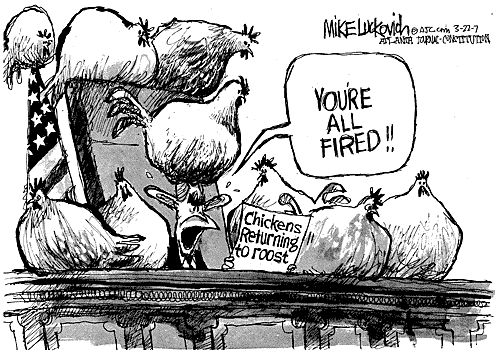
Building an Embassy Fit for an Empire
By Adil E. Shamoo, The Baltimore Sun
Posted on March 22, 2007, Printed on March 22, 2007
http://www.alternet.org/story/49518/
The headline reads: "Thousands of angry Iraqis pillage billion-dollar U.S. Embassy in Baghdad." The article details the ransacking of the grandiose American Embassy by Iraqi mobs.
This is the story I expect to read one day within the next decade.
In the 1950s, when I was in high school in Baghdad, my friends and I admired the technological advances of America and the West. But we resented the colonial tendencies of the West (especially, at the time, those of the British). Many demonstrations were held in front of the British and American embassies. The Iraqis are a proud people, and they resented foreigners meddling in their affairs. And the British were, in reality, running the country through a puppet regime.
You may call it false pride; you may call it a preoccupation with dignity; or you may simply call it an honest concern about sovereignty. In any case, this is what the culture of the region dictates.
So, with this in mind, why has Washington never taken the cultural context of the Iraqis into consideration? Instead, Congress has appropriated nearly $1 billion to build the largest embassy in the world. A significant portion of that money is for security infrastructure. This future "fortress" is housed in Saddam Hussein's former palace -- providing more bad symbolism to the Iraqis.
Why are we building such a mammoth embassy in the heart of Baghdad? The embassy complex is on 104 acres, with 21 buildings and facilities. It will eventually house a U.S. staff of 5,000. According to a recent report in the Washington Post, it has more than twice the staff and 20 times the budget of our Beijing embassy. The embassy will surpass all others in terms of size and staffing.
One would think that we would be more clever than that in camouflaging our occupation. Are we to believe that Iraqis will not take notice of this massive complex in the heart of Baghdad?
We will be attempting to legitimize our presence with a "negotiated" agreement with the government of Iraq. If that happens, the people of Iraq will know that their elected government no longer is representing them but rather has become another puppet government. More Iraqis will become radicalized and join foes of the government.
American forces left Saudi Arabia in order to reduce hostilities toward us and to prevent further recruitment by groups opposing the United States and the Saudi royal family. Why would our officials think that the same will not happen in Iraq?
The Roman Empire, which (depending on your definition) lasted from 1,000 to 1,500 years, was the longest-lasting empire in history. Empires are destined to decline. Despite our intentions to stay in Iraq for a long time, Iraqis will not allow their country to be an extension of the American empire.
Adil E. Shamoo, born and raised in Baghdad, is a professor at the University of Maryland School of Medicine. He is a contributor to Foreign Policy In Focus.
© 2007 Independent Media Institute. All rights reserved.
View this story online at: http://www.alternet.org/story/49518/
Sunday, March 25, 2007
AP: Hagel: Some see impeachment as option
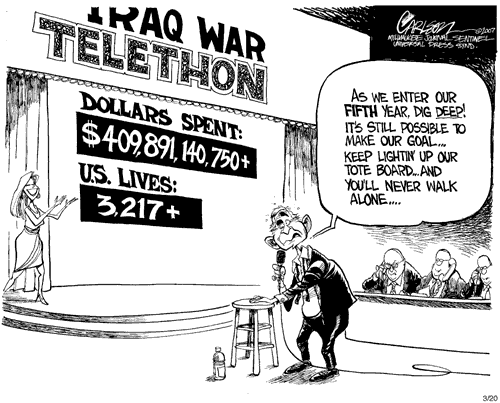
Hagel: Some see impeachment as option
By HOPE YEN, Associated Press WriterSun Mar 25, 2:04 PM ET
With his go-it-alone approach on Iraq, President Bush is flouting Congress and the public, so angering lawmakers that some consider impeachment an option over his war policy, a senator from Bush's own party said Sunday.
Meanwhile, the Senate's No. 2 Republican leader harshly criticized House Democrats for setting an "artificial date" for withdrawing troops from Iraq and said he believes Republicans have enough votes to prevent passage of a similar bill in the Senate.
"We need to put that kind of decision in the hands of our commanders who are there on the ground with the men and women," said Sen. Trent Lott (news, bio, voting record), R-Miss. "For Congress to impose an artificial date of any kind is totally irresponsible."
GOP Sen. Chuck Hagel (news, bio, voting record) of Nebraska, a member of the Senate Foreign Relations Committee and a frequent critic of the war, stopped short of calling for Bush's impeachment. But he made clear that some lawmakers viewed that as an option should Bush choose to push ahead despite public sentiment against the war.
"Any president who says, I don't care, or I will not respond to what the people of this country are saying about Iraq or anything else, or I don't care what the Congress does, I am going to proceed — if a president really believes that, then there are — what I was pointing out, there are ways to deal with that," said Hagel, who is considering a 2008 presidential run.
The Senate planned to begin debate Monday on a war spending bill that would set a nonbinding goal of March 31, 2008, for the removal of combat troops.
That comes after the House narrowly passed a bill Friday that would pay for wars in Iraq and Afghanistan this year but would require that combat troops come home from Iraq before September 2008 — or earlier if the Iraqi government did not meet certain requirements.
On Sunday, Hagel said he was bothered by Bush's apparent disregard of congressional sentiment on Iraq, such as his decision to send additional troops. He said lawmakers now stood ready to stand up to the president when necessary.
In the April edition of Esquire magazine, Hagel described Bush as someone who doesn't believe he's accountable to anyone. "He's not accountable anymore, which isn't totally true. You can impeach him, and before this is over, you might see calls for his impeachment. I don't know. It depends on how this goes," Hagel told the magazine.
In his weekly address Saturday, Bush accused Democrats of partisanship in the House vote and said it would cut the number of troops below a level that U.S. military commanders say they need. Vice President Dick Cheney also accused Democrats of undermining U.S. troops in Iraq and of sending a message to terrorists that America will retreat in the face danger.
"We have clearly a situation where the president has lost the confidence of the American people in his war effort," Hagel said. "It is now time, going into the fifth year of that effort, for the Congress to step forward and be part of setting some boundaries and some conditions as to our involvement."
"This is not a monarchy," he added, referring to the possibility that some lawmakers may seek impeachment. "There are ways to deal with it. And I would hope the president understands that."
Lott said setting withdrawal dates is a futile and potentially dangerous exercise because Bush has made clear he will veto any such legislation.
"There are members in the Senate in both parties that are not comfortable with how things have gone in Iraq," Lott said. "But they understand that artificial timetables, even as goals, are a problem. ...We will try to take out the arbitrary dates."
Sen. Bill Nelson (news, bio, voting record), D-Fla., said the Senate bill seeks to heed the recommendations of the bipartisan Iraq Study Group by setting a goal of withdrawing some troops while leaving others behind to train the Iraqi army for border patrol and other missions.
"That, combined with a very aggressive, diplomatic effort in the region is what we're going to need to have," he said.
Sen. Dianne Feinstein (news, bio, voting record), D-Calif., said she believed that setting a timetable was appropriate but declined to predict whether it would garner enough Senate votes to pass.
"People of this country have spoken overwhelmingly. It's been constant now," Feinstein said. "They want us out. It is time for the Senate to weigh in. I hope we will have the votes."
Hagel spoke on ABC's "This Week," Feinstein and Lott appeared on "Fox News Sunday," and Nelson was on CNN's "Late Edition."
Saturday, March 24, 2007
Raw Story: Kucinich video asks if it's time to begin impeachment proceedings against Bush
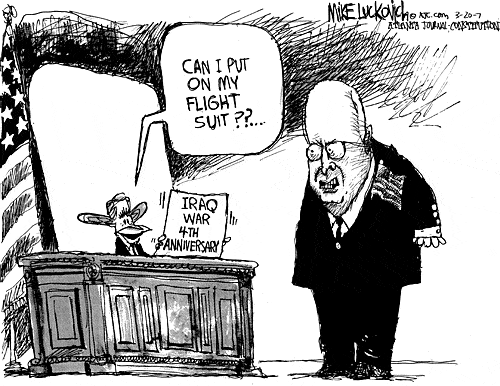
Kucinich video asks if it's time to begin impeachment proceedings against Bush
03/19/2007 @ 1:39 pm
Filed by Ron Brynaert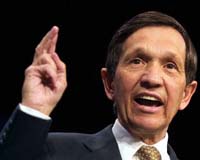 In a new video posted at YouTube.com and at his campaign website, Rep. Dennis Kunich (D-OH) asks if it's time for Congress to begin impeachment proceedings against President Bush.
In a new video posted at YouTube.com and at his campaign website, Rep. Dennis Kunich (D-OH) asks if it's time for Congress to begin impeachment proceedings against President Bush.
Last Thursday, as RAW STORY reported, Kucinich declared during a speech on the House floor that "impeachment may well be the only remedy which remains to stop a war of aggression against Iran." The 2004 presidential candidate, who is running again in 2008, told RAW STORY that his House floor statement "speaks for itself."
"This House cannot avoid its constitutionally authorized responsibility to restrain the abuse of Executive power," Kucinich said on the floor Thursday. "The Administration has been preparing for an aggressive war against Iran. There is no solid, direct evidence that Iran has the intention of attacking the United States or its allies."
Kucinich added, "Since war with Iran is an option of this Administration and since such war is patently illegal, then impeachment may well be the only remedy which remains to stop a war of aggression against Iran."
"I'm asking you. Do you think it's time?"
In the three-and-a-half minute video which was posted on the fourth anniversary of the US-led invasion of Iraq War, Kucinich states, "We are in an interesting condition in this country, where we are told to take impeachment off the table, and keep on the table a U.S. military attack against Iran."
"Kucinich was referring to the long-standing insistence of some House Democrats that impeachment was 'off the table' in Congress, and to the removal last week of a clause in the pending Iraq War appropriations bill that would have insisted the President come to Congress for approval before launching any military action against Iran," explains a press release obtained by RAW STORY.
Kucinich continues, "This past week, in the Congress of the United States, I noted that the administration has threatened aggressive war against Iran. This is a violation of the UN charter. Charters are treaties. Article 6 of the Constitution of the United States says that treaties are the law of our land, the supreme law of our land."
"It's illegal to threaten aggressive war against another nation," Kucinich states. "Iran has no ability to attack us. And they do not have the intention to attack the United States."
The 2008 presidential candidates is calling on people to help him mount a "peace stand."
"We cannot let this administration go any deeper into this journey, into destroying democratic governance, trashing our Constitution, forgetting the very purpose of this nation," Kucinich adds. "America was never meant to be a nation forever on the warpath. It was meant to be a nation which also had the capacity to 'Promote the General Welfare.' We need to reevaluate the direction of this administration by looking at its conduct in office, by determining whether it has faithfully followed the laws of our nation."
Kucinich insists that he is "prepared to start that process."
"I began this week with a speech on the floor of the house, which warned the administration that its actions toward Iran already constitute a case to ask the question about impeachment," Kucinich states.
"So I'm asking you, what do you think?" Kucinich asks at the end of the video. "Do you think it's time?"
Video as posted at YouTube and at Kucinich 2008:
Transcript of video:
#
My fellow Americans. We are in an interesting condition in this country, where we are told to take impeachment off the table, and keep on the table a U.S. military attack against Iran.
This really calls for a new thinking. It calls for us to reconsider very deeply the moment that we're in – where our Constitution is being trashed, where international law is being violated, where our hopes and dreams for the education of our children, for the health of our people, for housing, for our veterans, are being set aside as we go deeper and deeper into war.
We need a whole discussion in America. And with your help, we're about to have one.
This past week, in the Congress of the United States, I noted that the administration has threatened aggressive war against Iran. This is a violation of the UN charter. Charters are treaties. Article 6 of the Constitution of the United States says that treaties are the law of our land, the supreme law of our land.
It's illegal to threaten aggressive war against another nation. Iran has no ability to attack us. And they do not have the intention to attack the United states.
We are at a moment in human history where we have to make a decision whether we are going to go deeper into war, or whether we are going to take a stand on behalf of peace.
I determined a long time ago to take that stand on behalf of peace. And I want to enlist you and enroll you in taking that same stand.
We cannot let this administration go any deeper into this journey, into destroying democratic governance, trashing our Constitution, forgetting the very purpose of this nation. America was never meant to be a nation forever on the warpath. It was meant to be a nation which also had the capacity to “Promote the General Welfare.”
We need to reevaluate the direction of this administration by looking at its conduct in office, by determining whether it has faithfully followed the laws of our nation.
I'm prepared to start that process. I began this week with a speech on the floor of the house, which warned the administration that its actions toward Iran already constitute a case to ask the question about impeachment.
So I'm asking you, what do you think? Do you think it's time?
#
Friday, March 23, 2007
NYT: For Many Iraqis, Hunt for Missing Is Never-Ending
Thursday, March 22, 2007
Reuters: G.I. Is Jailed for Killing Iraqi Detainees
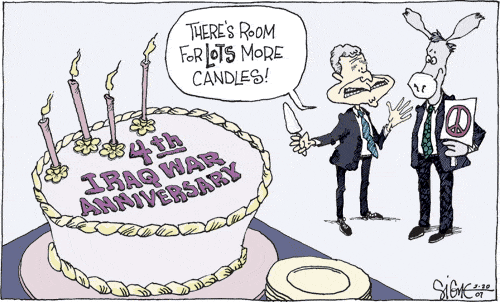
G.I. Is Jailed for Killing Iraqi Detainees
CHICAGO, March 19 (Reuters) — An American soldier was sentenced to 10 years in prison on Monday after a court-martial found him guilty of killing three Iraqi detainees who were freed and told to run before being shot, officials at Fort Campbell in Kentucky said.
The soldier, Sgt. Raymond Girouard, 24, of Sweetwater, Tenn., had been charged with premeditated murder and other offenses that could have drawn a life sentence, but the military jury hearing his case convicted him on Friday of negligent homicide, a lesser offense.
The sentence is subject to review by the commanding general at the post, and Sergeant Girouard could be paroled after serving about a third of the 10-year sentence, a spokesman said.
Sergeant Girouard led a squad in May 2006 during a raid on a suspected insurgent camp southwest of Tikrit, when the killings occurred.
Three other soldiers under his command who were also charged with the deaths made plea agreements earlier and have been sentenced. Two received 18-year prison sentences and a third got nine months in jail.
The three had said Sergeant Girouard ordered them to shoot the men. He had said he was under orders to kill all men of military age but denied ordering the slayings.
During a hearing in Iraq in August that led to the charges, a witness testified that he saw the prisoners trying to run away at full sprint, some with their blindfolds down, when they were shot.
Wednesday, March 21, 2007
ImpeachBush.org: Tens of Thousands March on the Pentagon and Call for Impeachment
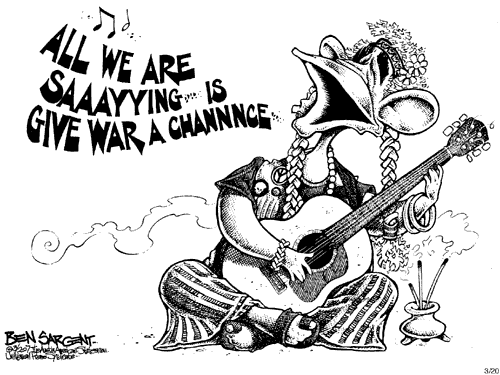
 The March on the Pentagon, March 17, 2007 |
As Ramsey Clark stated at the Pentagon rally, the effort to Impeach Bush has immediate and long term consequences. The Bush regime is rotting from within. Growing scandals are an indicator. The public revulsion to the endless lies about Iraq has set the stage even more so. Impeachment can and must become a reality and we can do it with your continued support.
Please make a donation today to sustain this intensifying campaign of newspaper ads, mass demonstrations, rallies and lobbying. Click this link to make a donation today.
Ramsey Clark challenged all of us when he spoke at the Pentagon: "We¹ve got work to do. If you thought about what will happen in the next 22 months if we don't act now, there will be a big buildup of U.S. troops in Iraq. That's what the surge is about. It's a permanent surge."
Tuesday, March 20, 2007
NYT: Don’t ‘Pack Up,’ Bush Says After 4 Years of War
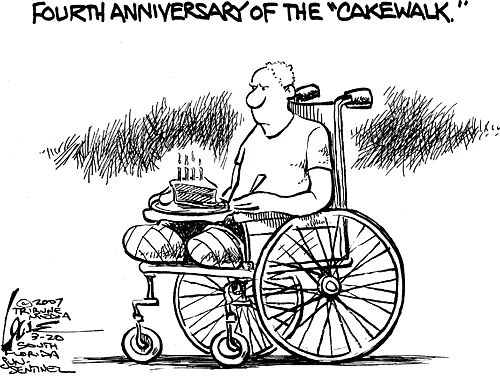
 | ||

Speaking on Monday on the fourth anniversary of the invasion, President Bush said the new security plan will take time.
Don’t ‘Pack Up,’ Bush Says After 4 Years of War
WASHINGTON, March 19 — President Bush marked the fourth anniversary of the invasion of Iraq on Monday with a plea for patience and a stark warning against the temptation "to pack up and go home."
Mr. Bush's brief speech came in the midst of an increasingly tense showdown with the Democratic-controlled Congress over the constitutional balance of power during war. The House is scheduled to vote Thursday on a Democratic proposal to attach conditions to the president's $100 billion war financing package that would require American combat troops to be withdrawn from Iraq next year, a timetable Mr. Bush has said would undercut the troops and aid the insurgents.
Mr. Bush's commemoration of the anniversary, delivered beneath a portrait of Theodore Roosevelt as a Rough Rider, was notable for the sharp change in tone from his speeches in the heady, early days of the war — when it still appeared possible that a quick victory in Baghdad could be followed by a relatively swift withdrawal. In those first few months, Mr. Bush argued that he was on the way to spreading democracy throughout the Middle East through the euphoria that would surely follow the unseating of Saddam Hussein.
But on Monday Mr. Bush made no reference to democracy. In his only reference to the regional effects of the war, he cautioned, "If American forces were to step back from Baghdad before it is more secure, a contagion of violence could engulf the entire country; in time, this violence could engulf the region."
In an echo of the initial case for war, Mr. Bush warned that Iraq could become a staging ground for terrorists to plan devastating attacks on the order of 9/11.
Anniversaries of the invasion have become more politically fraught in the years since the invasion. Mr. Bush used his statement on Monday to argue that it was the responsibility of Congress to support the troops already there, and that he alone had the authority to decide the strategy and the timetable for adding or withdrawing troops.
"They have a responsibility to get this bill to my desk without strings and without delay," Mr. Bush said of the war financing package.
Also on Monday, the administration released a statement calling the House bill "unconscionable" and saying that the president would veto it if it was passed.
But where Democrats once feared they were vulnerable to charges that they were undercutting the troops by defying the commander in chief, they expressed no such concern on Monday. Reflecting Mr. Bush's low approval ratings and the widespread discontent with continuing American casualties, they used the anniversary on Monday to go on the attack.
"After four years of failure in Iraq, the president's only answer is to do more of the same," Senator Harry Reid of Nevada, the majority leader, said in a statement. Referring to Republican efforts to defeat a resolution in the Senate calling for a 2008 troop withdrawal, Mr. Reid added, "With the blessing of Senate Republicans, he's committing more U.S. troops to an open-ended civil war."
Democrats are hardly unified on the war: some are concerned that Democrats could be blamed for whatever happens in Iraq if Congress specified dates for withdrawal.
In the mid-1990s, President Clinton regularly clashed with Republicans in Congress as they sought to limit United States involvement in United Nations peacekeeping missions, leading to charges from Mr. Clinton that Congress was infringing on presidential war powers.
The Iran-contra affair during President Reagan's term was itself a reaction to Congressional restrictions on the United States involvement in Nicaragua's civil war.
But the most direct parallel might be Vietnam, when Congress tried to limit presidential maneuvering room as protests over the war increased in volume — including the 1970 repeal of the Gulf of Tonkin resolution that was an important part of Congressional assent for the United States involvement in the war.
It remains unclear whether the House Democrats will have the votes to approve the bill tying funding of the war to benchmarks and the goal of a 2008 withdrawal. "We're in the hunt," said Representative Rahm Emanuel of Illinois, the Democratic conference chairman.
Mr. Bush's explicit reference to the temptation to leave Iraq was in sharp contrast to other moments when he has commemorated milestones in the war. His well-known statement aboard the aircraft carrier Lincoln in the late spring of 2003 — declaring an end to active combat — was a celebration of what initially looked like a quick military victory. But that was before the rise of the insurgency and counterattacks by Shiite militias.
In 2003, both White House and Pentagon officials said that any American presence in Iraq four years later would most likely be relatively small. On Monday, the White House was instead pressing anew its claims that withdrawal would result in defeat.
"It is a withdraw-the-troops bill, not a fund-the-troops bill," Tony Snow, the White House spokesman, said of the Congressional legislation during a news briefing that followed Mr. Bush's remarks. "It would also force failure of the mission in Iraq and forfeit the sacrifices made by our troops."
In keeping with the political jockeying of the day, Mr. Snow attacked the bill for also including several items of political pork, presumably inserted to secure votes of the faint of heart.
But Mr. Snow faced skepticism from reporters on Monday, fencing with them over a new poll of Iraqis showing that they hold a gloomy view of the future. At one point Mr. Snow snapped, "Zip it" during an argument with a CNN reporter over whether the administration could provide a "recipe for success" at a time when it was portraying the Democrats as putting forward a recipe for failure.
White House officials on Monday said the political pressure to leave Iraq would abate when conditions on the ground appeared more positive.
But officials acknowledge that they are in a race between better results in Iraq and a Democratic Congress beginning to insert itself in decisions about war and peace.
Sunday, March 18, 2007
Reuters: Chlorine bombs poison hundreds in Iraq
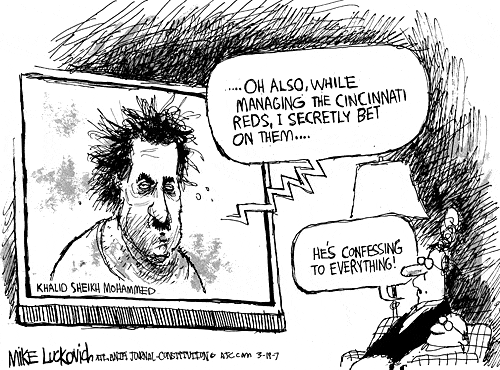

Chlorine bombs poison hundreds in Iraq
By Waleed Ibrahim 57 minutes ago
Insurgents in western Iraq set off three chlorine gas car bombs, U.S. forces said on Saturday, weeks after two similar attacks sparked fears of a new campaign to use unconventional weapons in Iraq.
The Friday attacks came a month into a major U.S.-Iraqi security crackdown in Baghdad aimed at stemming sectarian violence that threatens to pitch Iraq into outright civil war.
In Washington, thousands of anti-war demonstrators, some carrying signs reading "U.S. out of Iraq now!" marched toward the Pentagon on Saturday.
Police said about two dozen protesters had been arrested in front of the White House late on Friday, just days ahead of the fourth anniversary of the start of the war.
Anti-war demonstrations were also staged or planned in Los Angeles and Austin, Texas, as well as in Australia, Britain, and Canada.
Australian Prime Minister John Howard, one of Washington's most loyal allies in the war, visited Baghdad on Saturday and told Prime Minister Nuri al-Maliki that Australia would keep its troops in Iraq as long as they were needed.
The Australian Broadcasting Corporation said Howard's plane made an emergency landing after a visit to Australian troops in southern Iraq. The plane's loading bay filled with smoke, forcing it to return to Talil airbase. The cause of the incident was not immediately clear. Howard disembarked safely.
Chlorine gas was widely used in World War One but its use in insurgent attacks in Iraq has particular resonance there. Saddam Hussein attacked Kurdish areas with chemical weapons in the 1980s during the Iran-Iraq war.
The U.S. military said two suicide bombers driving dump trucks carrying chlorine made 350 people ill near the town of Falluja on Friday, and a smaller car bomb near Ramadi also released chlorine, though there were few casualties.
The U.S. statement reported two deaths in one of the attacks but hospital sources said earlier eight people were killed and dozens became ill after the two bombings in the Falluja area.
Two bombs with chlorine killed eight people earlier this year. It causes severe burns when inhaled and can cause death.
The U.S. military said they discovered an al Qaeda car bomb factory last month near Falluja with chlorine tanks.
Anbar, a mainly Sunni Arab province in which Falluja lies, has long been among the most troublesome areas of Iraq for U.S. forces.
HOUSING HIT
Friday's two bombs near Falluja exploded within 40 minutes of each other.
In the first, near the town of Amiriya, two Iraqi police were killed and up to 100 Iraqis showed signs of chlorine exposure, with symptoms ranging from minor skin and lung irritation to vomiting, the U.S. statement said.
Soon afterwards, a suicide bomber detonated a dump truck carrying a 200-gallon (900-liter) chlorine tank rigged with explosives south of Falluja. Around 250 civilians became ill.
Earlier on Friday, a smaller bomb using chlorine detonated at a checkpoint northeast of Ramadi, the capital of Anbar, wounding one U.S. soldier and one Iraqi civilian.
Hospital sources said one of the Falluja attacks targeted a large housing complex, killing six people including policemen, while the second targeted a tribal leader opposed to al Qaeda.
U.S. commanders say a growing number of tribes in Anbar have joined forces to take on al Qaeda, which has hit back with major bombs targeting civilians.
Baghdad was relatively quiet on Saturday, but a suicide car bomb in the west of the city killed two people, including one policeman, and wounded five.
There were no reports of further trouble in Sadr City, a Shi'ite militia stronghold where about 2,000 supporters of radical anti-American cleric Moqtada al-Sadr gathered on Friday to demand U.S. forces withdraw.
Sadr City, a stronghold of Sadr's Mehdi Army militia, is seen as a crucial test of Maliki's plan to crack down on violence by both Shi'ite militias and Sunni Arab insurgents.
(Additional reporting by Mussab Al-Khairalla, Claudia Parsons and Ibon Villelabeitia in Baghdad and Caren Bohan in Washington)

